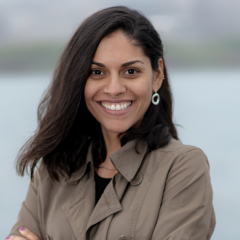As Is
As Is
By Priscila Pereira
Growing up, I didn’t learn how to
brush my hair as is
style my hair as is
nourish my hair as is
love my hair as is
Growing up, I didn’t learn how to
dress up with my hair as is
feel pretty with my hair as is
feel sexy with my hair as is
feel powerful with my hair as is
Growing up, I didn’t learn how to
enjoy the wind on the road with my hair as is
feel the sun after a dive with my hair as is
be me with my hair as is.
Instead of as is, my hair was always expected to be
straighter
shinier
longer
healthier, even when it couldn’t really be healthy with
all the artificial substances in the hair products my family could afford
all the blow drying
all the flat ironing
and all the chemicals from the Brazilian blowouts.
It did not matter my hair was already straight
There was always the need to be
Straighter– “especially in your forehead, Priscila!”
There was always the need
to look as different as possible
From
‘the Black hair.’
“But what Black hair?”, you may ask
This one from my grandmother
My father
My aunties
My cousins
That hair
So alien to my mother
My other grandmother
My other aunties
My other cousins.
This hair
So diverse in texture, color, length, style, and possibilities
That hair
used to decide who is not pretty, who can’t have the job, who can’t be in the group
This hair
a symbol of liberation, defiance, self-love, community love, and empowerment
so many years of not learning my hair as is
but fear not
I haven’t finished growing up
And when I do, I will have learned how to
style my hair as is
nourish my hair as is
dress up with my hair as is
feel powerful with my hair as is
love my hair as is.
And then,
I will be seen with my hair … as is.
I will be free with my hair … as is.
I will be me with my hair … as is.
Priscila Pereira

Born and raised in Brazil, Priscila Pereira is an advanced PhD student pursuing a degree in Mathematics and Science Education and a minor in Gender and Women’s Studies. Her research focuses on the educational experiences of Black and Afro-Brazilian women in higher education in Brazil and the U.S. Besides her student responsibilities, Priscila is engaged in different academic and community-based projects focused on honoring Black women’s lives. She also believes in living a holistic lifestyle and is a yoga practitioner, healthy food enthusiast, and dog mom.